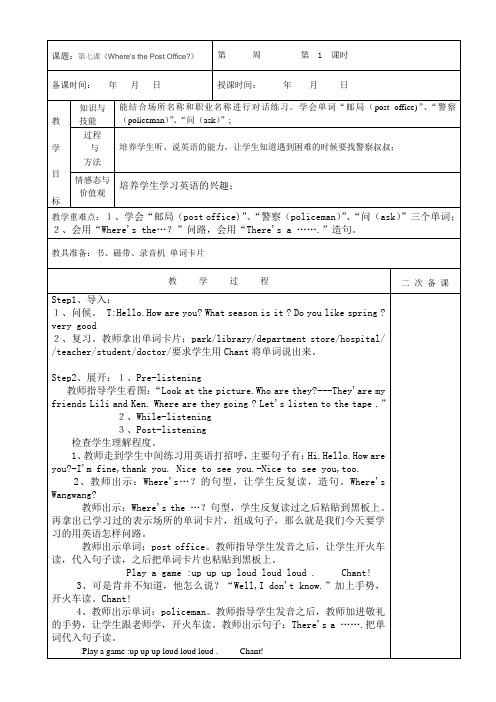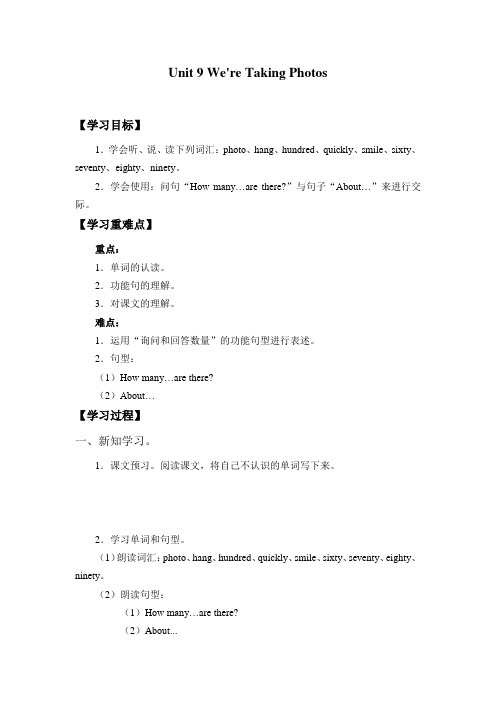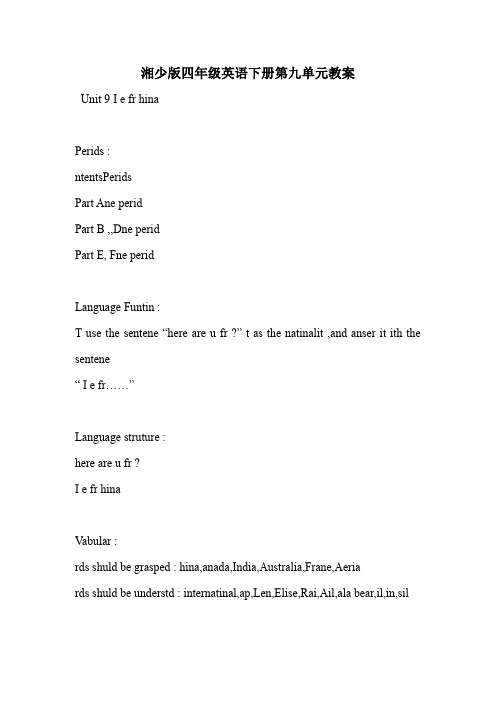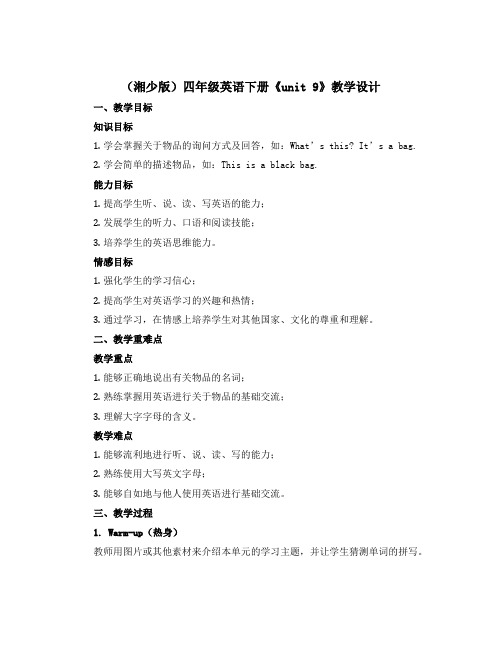最新EEC版小学英语四年级下册Unit 9 We re Taking Photos 公开课课件1
- 格式:ppt
- 大小:694.00 KB
- 文档页数:5


Unit 9 We're Taking Photos【学习目标】1.学会听、说、读下列词汇:photo、hang、hundred、quickly、smile、sixty、seventy、eighty、ninety。
2.学会使用:问句“How many…are there?”与句子“About…”来进行交际。
【学习重难点】重点:1.单词的认读。
2.功能句的理解。
3.对课文的理解。
难点:1.运用“询问和回答数量”的功能句型进行表述。
2.句型:(1)How many…are there?(2)About…【学习过程】一、新知学习。
1.课文预习。
阅读课文,将自己不认识的单词写下来。
_________________________________________________________________________________________________________________________________________________________________________________2.学习单词和句型。
(1)朗读词汇:photo、hang、hundred、quickly、smile、sixty、seventy、eighty、ninety。
(2)朗读句型:(1)How many…are there?(2)About...(3)小组活动,练习上述句型。
S1: How many…are there?S2: About…二、达标检测。
1.根据给出的图片和信息,将句子补充完整。
(1)books/five hundreds—____________________ are there?—About ______________________(2)stars/one hundred—____________________ are there?—About ______________________(3)taking photos—What are they doing?—_________________________ 2.根据对话信息,完成问题。

(EEC)四年级英语下册Lesson9WeareTakingPhotos教Lesson 9 We’re T aking Photos.(第一课时)教材分析: 本课的教学内容为EEC小学英语课本第四册Lesson 9 We’re Taking Photos.第一课时,课文主要是学习Be+ ving.句型,之前,学生接触过现在进行时的简单句型,对现在进行时有了初步认识,本课是对现在进行时的拓展及实际应用,并用以前学过的动词进行简单的表述,让学生能将所学内容与生活联系起来,真正的运用到生活中去学生分析在本课中学生所要接触的知识曾经在上一册书中学习过,较为简单,对于学生来说,会感觉到轻松,他们会比较愿意参加到教学活动中来。
本节课为这九单元的第一课时,继续巩固上以前学习的内容。
教学目标1单词:can,cold,come,hang,help,look.2 You look hot. It’s very hot. We’re hanging Christmas lights.Can you help me?Sure,I can.教学重、难点: 1. Be+ving.教学准备录音机、单词卡片.课件教学流程Step 1、热身问候1、Good morning boys and girls.2、Free talk3 Introduce this lesson.4. 新课呈现:① Listen to the tape.(Join the Beat!)②. T: 表情动作 hot cold. sick, happy ,sad and so on.Ken: You look hot.She looks cold./He looks cold. and so on.Jess: Yes.It’s very hot. /No. It’s not very hot.Ss: cold hot warm windy rainy cloudy snowy sunny.Ss;We’re hanging lights.板书:hang light 带读书写T:吉米向罗宝请求“你能帮我吗?”是怎么说的?Can you help me ?Sure ,I can /Sorry ,I can’t.4.Chant! Chant。

湘少版四年级英语下册第九单元教案Unit 9 I e fr hinaPerids :ntentsPeridsPart Ane peridPart B ,,Dne peridPart E, Fne peridLanguage Funtin :T use the sentene “here are u fr ?” t as the natinalit ,and anser it ith the sentene“ I e fr……”Language struture :here are u fr ?I e fr hinaVabular :rds shuld be grasped : hina,anada,India,Australia,Frane,Aeriards shuld be understd : internatinal,ap,Len,Elise,Rai,Ail,ala bear,il,in,silGraa:n the sund f “i” in the rdPerid 1Basi ais f this lessn :1Understand and sa the ne rds hina ,anada,India,Australia,Frane ,Aerian; 2Understand and sa the dialgue ;3rretl use the sentene “here are u fr?” “I e fr …”Teahing diffiulties :Grasp the untr naesTeahing aids :A ap f the prld (a glbe ) , rdsards (ship ,ar,plane,bile ,bus ,taxi,hina,anada,IndiaAustralia , Frane , Aeria ) , headars ,teahing pitures , tape –rerderTeahing predure :Step 1 aring up1Greetings2Sing English sng3Revie the rds :ship,ar,plane,bile,bus,taxi abut the eans f transprtGae -----Guess,guess,guess !Step 2 Presentatin and drill1Sh se rd ards t Ss :T : These bring us t plaes hat d u lie ?S1: I lie ship / …S2 : I lie …T : abe st hilden lie the planeIt an tae us t travel all ver the rld L ! It is a ap f the rld This is hina e live in hina(Learn the rd hina )2Pint t the ap t teah the ne rds : anada,India,Australia,Frane Gae -----Guess,guess,guess!3 As a student t ear the headar t at AnneT : Bs and girls , I have a ne friend h is she ? Guess , please ! Ss : …T : She Anne Anne ! here are u n ?Anne : I a here Hell !T :Hell ,Anne ! Bs and girls , this is Anne Let us sa “Hell” t her Ss :Hell ,Anne !Anne : Hell, everne!T : here are u fr, Anne ?Anne : I’fr Australia here are u fr?T : h, I ’fr hina( Learn the sentene “here are u fr ?” “ I a fr …” )4 Use the sae a t teah the rds : anada ,Frane and s n Drill the sentene grup b grup and at itStep 3 Pratie Part A1Listen t the tape and fill in the blanNaeLenAnneEliseRaiAilutr2 Listen and read3Pratie t read4At it in rlesStep 4 nslidatinPerid 2Basi ais f this lessn :1 Grasp the untr rds2 Grasp the sentene pattern t tal freel3 Read and understand part DTeahing diffiulties :Grasp the ne rds ;Read part D; Express the natinalit rretlTeahing aids :Tape-rerder , rd ardsStep 1 aring up1Greetings2Free talStep 2 Presentatin and drillae a blanNae untrNaeuntr…hinaAnneAustraliaLenAeriaEliseanadaRaiIndiaAilFraneT : Bs and girls, here are u fr ?Ss : I’fr hina Anne is fr Australia Len is fr Aeria Gae---aing friendsStep 3 Pratie1Part2Part Dhat present des Din reeive ?Step 4 nslidatinPerid 3Basi ais f this lessn :1 Grasp the sund f i ,and understand the rds in part E2 Read the rds and sentene in part E3 Learn t rite “e fr hina”4 Finish part FTeahing diffiulties and iprtane :Understand and read the sentene ;n the untr ulture and ustTeahing aids :rd ards ,tape—rerder and s nStep 1 aring up1 Greeting2 Sing an English sng3 Revie the rds and sentene patterns have learnedStep 2 Presentatin and drillPart E1 Sh rd ards il,in,sil,and find ut the reading rules2 Listen ,read and understand the sentene3 Learn t rite the phrase “e fr hina ”Step 3 PratiePart F ath the pitures t the right flagsStep 4 nslidatin。

(湘少版)四年级英语下册《unit 9》教学设计一、教学目标知识目标1.学会掌握关于物品的询问方式及回答,如:What’s this? It’s a bag.2.学会简单的描述物品,如:This is a black bag.能力目标1.提高学生听、说、读、写英语的能力;2.发展学生的听力、口语和阅读技能;3.培养学生的英语思维能力。
情感目标1.强化学生的学习信心;2.提高学生对英语学习的兴趣和热情;3.通过学习,在情感上培养学生对其他国家、文化的尊重和理解。
二、教学重难点教学重点1.能够正确地说出有关物品的名词;2.熟练掌握用英语进行关于物品的基础交流;3.理解大字字母的含义。
教学难点1.能够流利地进行听、说、读、写的能力;2.熟练使用大写英文字母;3.能够自如地与他人使用英语进行基础交流。
三、教学过程1. Warm-up(热身)教师用图片或其他素材来介绍本单元的学习主题,并让学生猜测单词的拼写。
2. Presentation(展示)1.询问物品教师出示物品,如包、书等,用英语进行询问,让学生回答。
例如:T: What’s this? S: It’s a bag.2.描述物品教师用英语描述物品的颜色、大小等特征,让学生理解并跟读。
3. Practice(练习)1.学生进行个人或小组练习,做类似的问答。
2.模仿和表演学生通过模仿和表演,巩固所学的基础交流能力。
4. Extension(拓展)1.以游戏或其他方式进一步练习所学知识和技能。
2.学生课后进行单词和句子的背诵。
四、教学评价1.让学生识记并应用本单元的基础创造性表达;2.在课堂上观察学生对英语学习的情况,了解学生的语言水平和表达能力;3.定期进行模拟测试,并分析学生的薄弱环节。

四年级下册英语第九课课文Lesson NineTitle: My Summer VacationIntroduction:During my summer vacation, I had a great time exploring new places, trying new activities, and spending quality time with my family and friends. In this lesson, I will share with you my exciting experiences and some interesting things I did during my vacation. Paragraph 1:To begin with, my family and I went to the beach for a week. The weather was perfect, with clear blue skies and a warm breeze. We built sandcastles, played beach volleyball, and swam in the sparkling ocean. I was so thrilled to learn how to surf! My dad taught me how to catch the waves and balance on the surfboard. It was challenging at first, but with practice, I was able to ride the waves and have a fantastic time.Paragraph 2:Next, we visited a famous national park. We trekked through lush forests, hiked up steep trails, and discovered breathtaking waterfalls. The park was teeming with wildlife, and I saw many deer, birds, and even a rabbit. It was like stepping into a nature paradise! We also camped overnight in tents and roasted marshmallows around a cozy campfire. The starry night sky was incredibly beautiful, and we lay on our backs, gazing at the twinkling stars.Paragraph 3:During my vacation, I also participated in a summer camp. It was a week-long program that offered a variety of fun activities and educational workshops. One of my favorite activities was learning how to make pottery. The instructor demonstrated the techniques, and then we each created our unique clay pots. I painted mine in vibrant colors and proudly took it home as a memento. Besides pottery, we also learned how to cook simple dishes, play musical instruments, and even tried our hand at painting.Paragraph 4:In addition to these adventures, I spent quality time with my grandparents. They live in the countryside, and I love visiting them during the summer. Every day, my grandpa and I worked in the vegetable garden, planting seeds, watering the plants, and picking fresh vegetables. We also fed the chickens and collected eggs. It was hard work but so much fun! Grandma treated us with delicious homemade meals, and we sat together, chatting and laughing. I cherish these moments with my grandparents as they teach me valuable life lessons and share stories from their youth. Paragraph 5:In conclusion, my summer vacation was an unforgettable experience filled with exciting adventures, new discoveries, and cherished moments with loved ones. From learning to surf to exploring national parks, attending a summer camp, and spending time with my grandparents, I had a blast. It was the perfect way to relax, have fun, and make lifelong memories. I can't wait for the next summer vacation to have more amazing experiences!。
四年级下册英语第9课课文The Lesson of \"A Trip to the Countryside\"Last week, our class had a special English lesson. Our teacher, Miss Li, told us that we were going on a trip to the countryside. We were all very excited because it was our first time going on a field trip for an English lesson.On the day of the trip, we gathered at the school gate and boarded a big yellow school bus. The bus ride was long, but we were all chatting and singing songs to pass the time. Finally, we arrived at a beautiful countryside village.As soon as we got off the bus, we could smell the fresh air and hear the birds chirping. Miss Li divided us into groups and assigned each group a task. My group's task was to interview thevillagers about their daily lives.We walked around the village and approached an elderly lady who was sitting outside her house. She had a warm smile on her face as she welcomed us. We asked her questions about her daily routine and what she liked about living in the countryside.She told us that she wakes up early every morning to tend to her vegetable garden. She loves being surrounded by nature and enjoys growing her own food. She also mentioned that living in the countryside allows her to have a peaceful and quiet life.After interviewing several villagers, wegathered together to share our findings with each other. We learned that most villagers enjoyed their simple lives in the countryside because they could breathe fresh air, eat healthy food, and haveclose-knit communities.Miss Li then asked us what lessons we learned from this trip. Many of my classmates raised their hands eagerly to share their thoughts. Some said they realized how important it is to appreciate nature and take care of our environment. Others mentioned how grateful they felt for their own homes and families.As I listened to my classmates' responses, I realized that this trip taught me an important lesson too - happiness can be found in the simplest things in life. The villagers we met may not have fancy gadgets or luxurious houses, but they were content and happy with what they had.As we boarded the bus to return to school, I looked out of the window and took one last look at the beautiful countryside. I made a promise to myself that I would always remember the lesson I learned from this trip - to appreciate the simple joys in life and find happiness in the little things.。